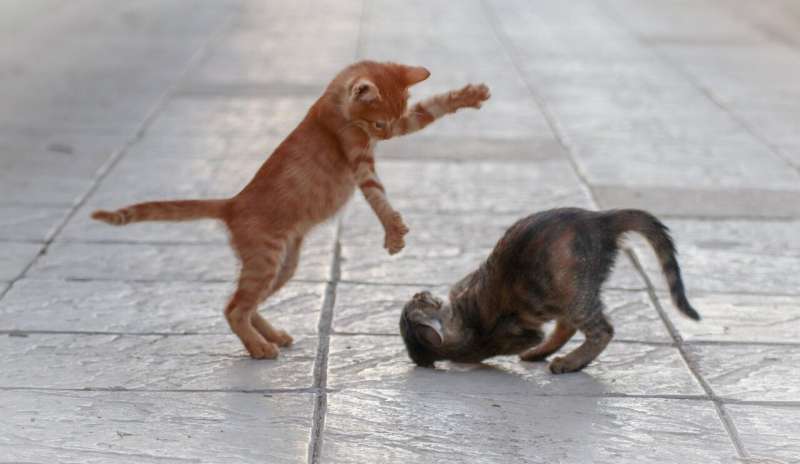This article has been reviewed according to Science X's editorial process and policies. Editors have highlighted the following attributes while ensuring the content's credibility:
fact-checked
trusted source
proofread
Playtime is purr-fect for your cat's welfare

Play is often considered an indicator and promotor of animal welfare. Playing with your cat may also nurture closer cat-human bonds. In a new study, scientists have investigated these links by applying in-depth empirical methods to analyze data gathered from around the world.
Researchers in the University of Adelaide from the School of Animal and Veterinary Science created an online survey in consultation with veterinarians, animal behaviorists, and cat guardians, to investigate play-related factors associated with welfare in cats. The outcome measures include: cat quality of life, cat-guardian relationship quality, problem behavior prevalence, and behavioral changes.
"Our survey results, based on responses from 591 cat guardians from 55 countries, indicated greater cat playfulness and more types of games played were significantly associated with better cat quality of life," said the University of Adelaide's Julia Henning, a Ph.D. Candidate, who led the study.
"Also, longer amounts of daily play, greater number of games, both cat and guardian initiating play, and heightened guardian playfulness were also associated with better quality cat-guardian relationships."
When it comes to indoor/outdoor cats, exclusively indoor housing was significantly associated with both increased cat quality of life and cat-guardian relationships compared to cats with outdoor access.
"Behavioral changes that indicated stress, frustration, or unease were reported when play was absent. Therefore, we can conclude play may be a very important factor in assessing and maintaining cat welfare," Ms Henning said.
The team recently published their findings in the Animal Welfare journal.
"Play has long been considered beneficial to cats. Pre-existing research links play to cats' long-term neurological, physiological, behavioral, and emotional skills, as well as fitness and general good health."
Associate Professor Susan Hazel, Senior Lecturer at the University of Adelaide who also worked on the study, said, "While our research is an important contribution to knowledge around cat welfare, self-reporting surveys have limitations."
"Cat lovers' answers may be prone to respondent and recall bias and limited in their ability to assess behavior."
"Participants who dedicated their time and effort on a voluntary basis are more invested in their cat's care than the average cat guardian. Therefore, responses may not be an accurate representation of the general population."
"Ultimately, we recommend more research is needed. Further investigations could solve exactly how much play and what kind is best suited to achieving improved cat welfare. That would be the cat's meow."
The research team included Dr. Torben Nielsen and Eduardo Fernandez, also from the School of Animal and Veterinary Science.
More information: Julia Henning et al, Cats just want to have fun: Associations between play and welfare in domestic cats, Animal Welfare (2023). DOI: 10.1017/awf.2023.2
Provided by University of Adelaide




















